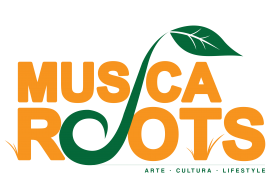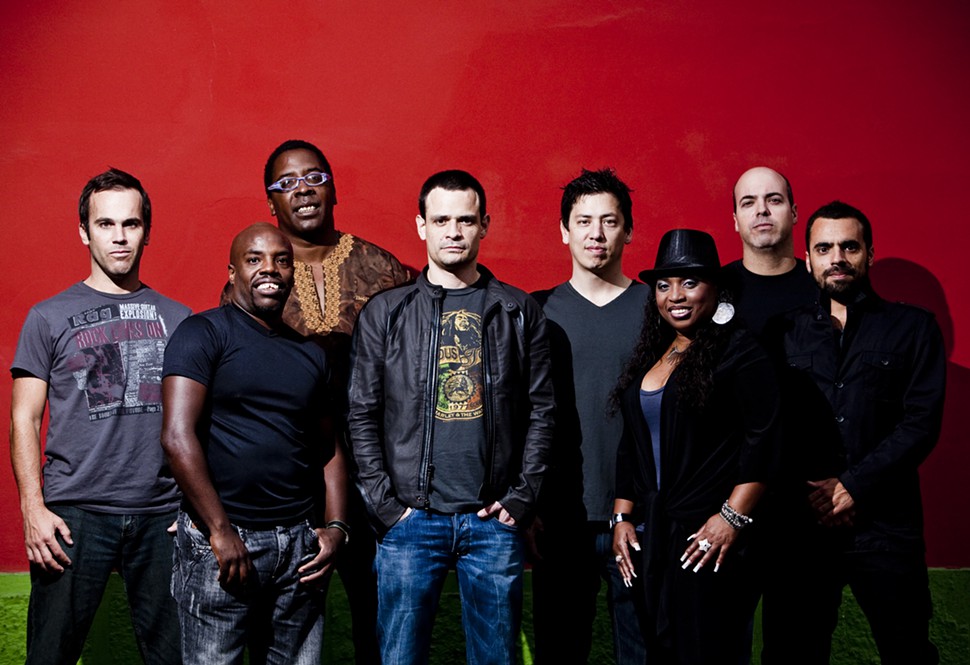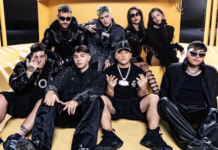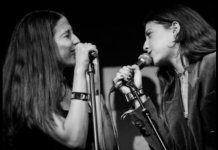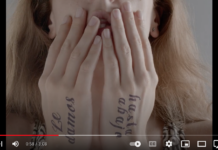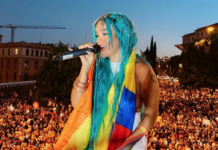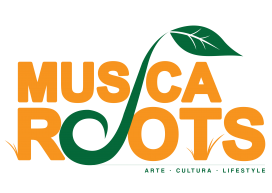Since its formation in 2001, Novalima has been breaking down boundaries, uniting seemingly irreconcilable genres, communities and generations to create an inspiring movement that has revolutionized the music scene in their native Peru. Founded by four friends from Lima with a shared passion for both traditional Afro-Peruvian music and modern DJ culture, Novalima searches for the common ground between past and future, between tradition and innovation. Their efforts have also helped bridge the divide between the Peruvian mainstream and the Afro-Peruvian community, a minority population that has struggled against discrimination and the threat of cultural dissolution for generations. Outside of Peru, Novalima has garnered critical acclaim from mainstream and underground media alike, a Latin Grammy nomination for Best
Alternative Album, and a featured spot in cult filmmaker Robert Rodriguez’s hit Mexploitation movie Machete
While their sound is futuristic and cutting-edge, the roots of Novalima’s music stretch back hundreds of years to the times of slavery and Spanish colonial rule. In a far-too-familiar tale, African slaves were brought to Peru as early as the 1500s until the middle of the 19th Century, establishing an outpost of African culture in South America. Over the years, the soul and rhythms of Africa blended with the melodies and instruments of Europe and the Andes. The result is rich musical repertoire that has existed for generations on the periphery of Peruvian popular culture.
The founders of Novalima, Ramon Perez-Prieto, Grimaldo Del Solar, Rafael Morales, and Carlos Li Carrillo, became friends and started playing in bands together while in high school in Lima, playing a pivotal part in the underground hardcore punk scene in the 80s, and the psycodelic/acid rock scene during the 90s. The children of artists and intellectuals, Ramon, Grimaldo, Rafael and Carlos were well educated and well traveled, and while they listened to traditional Peruvian folk music regularly in family reunions and in the street, they shared a fascination for rock, dub reggae, latin and electronic music, constantly exploring new sounds. Indeed, without modern technology, Novalima might not have developed, as the group came together at a time when the four founders were each living in different parts of the world. From their homes in London, Barcelona, Hong Kong and Lima, they started emailing song ideas to each other. These long-distance experiments resulted in their 2002 debut album, the self-titled Novalima.
The reception to the album exceeded their wildest expectations, eventually reaching platinum sales status in Peru, and for their next album they invited more Afro-Peruvian musicians to join their recording sessions. The outcome was Afro, an album that was released worldwide in 2006 to tremendous acclaim and put Novalima on the international music map. The London Metro Evening Standard raved, “Novalima has more than succeeded in bringing the spirit and soul of Peruvian blues into the 21st century.” Afro held the #1 spot on the US College Music Journal Latin Alternative and New World radio charts for ten weeks combined.
The founders of Novalima have since returned to Lima and invited some of their favorite Afro-Peruvian musicians to build the live show, which set the scene for a string of legendary festival performances around the world such as Roskilde, WOMAD, Pirineos Sur and Chicago’s Millenium Park.
© 2013 novalima music
On their 2009 album Coba Coba, Novalima expanded on the critically-acclaimed formula they developed with their two previous recordings, while taking their inspiring fusion in new and exciting directions.
On Coba Coba, Novalima delved further into the African roots of Afro-Peruvian music, bringing in influences from its musical cousins reggae, dub, salsa, hip-hop, afrobeat and Cuban son. The result was a modern approach to Afro-Peruvian music that made the genre accessible to a younger and wider public. In anticipation of the band’s acclaimed 2009 US and European tour, they released Coba Coba Remixed, featuring exclusive remixes by top DJs and producers from including Da Lata, Zeb, Faze Action, Seiji, Boozou Bajou, Haaksman, and more. The album was filled with funky beats and chilled out grooves that delighted fans of globally inspired dance and electronica. At the same time, a stunning music video for the band’s song “Coba Guarango” was featured on the home page of YouTube and quickly amassed well over 100,000 plays in 24 hours.
After two years of constant touring, in late 2010 the producers gathered in their home studio in Lima to record and mix their latest album, “Karimba” (hot iron used to mark the cattle, as well as the slaves). Karimba takes novalima music into new levels, introducing both new sounds and traditional rhythms like the Panalivio, Zamacueca, Ingá and Tondero, while maintaining their distinctive afro and dub sound. Their reputation at home has allowed them to work with the top traditional musicians in the city, inviting vocalists Pepe Vasquez, Rosita Guzman, and Sofia Buitron as well as guitarists Roberto Arguedas and Felix Casaverde (former guitarist of chabuca Granda), in addition to members of the live band.
For the worldwide release of Karimba, Novalima partnered with USA-based ESL Records (Thievery Corporation, Nickodemus), an ad-hoc home for their fusion of traditional and future sounds. Karimba (ESL Music) has garnered astounding press accolades from NPR, Giant Step, Nat Geo Music and more, while also topping the iTunes World Music Chart and cracking the top 10 Billboard World Music Chart, since its release on Jan 2012. Since the release, NOVALIMA have embarqued on a world wide promotional tour that have taken them to stages in USA, Canada, New Zeland, Australia and Latinamerica and will continue touring all through 2013!
New Album: KARIMBA DIABOLIC REMIXES
On the new album, Karimba Diabolic Remixes, out on June 25th, 2013, Novalima have a hand selecting some of their favorite remixers to re-interpret last year’s Karimba album to their own vision. The choice of remixers also reflects Novalima’s global appeal in the Latin diaspora worldwide. The UK is represented with well known West London producer Seiji’s heavy synth-based four-to-the-floor reworking of “Mamaye”, and UK / Brazilian supergroup Da Lata giving us a rootsy swinging version of “Malivio Son”. As it’s recently become a hotbed of Latin infused dance music and culture,
California is heavily represented with remixes from KCRW / AfroFunke DJ and Los Angeles mainstay Jeremy Sole fleshes out “Macaco” into a smooth call and response affair. SF based Acid Jazz legend DJ Smash delivers a squelchy, bouncy version of “Diablo”, while Bay Area veteran band Afrolicious freaks “Zarambe” into a dancefloor joint equally influenced by house music and Fela Kuti. LA/NYC DJ Sabo reinterprets “Diablo” with his signature deep and dirty Moombahton style, while Thievery
Corporation’s Rob Garza takes “Festejo” into swirling, psychedelic house vibe. NYC DJ producer and Wonderwheel label head Nickodemus takes “Mamaye” into bass and percussion heavy dancefloor territory, while Novalima affiliated DJ collective Coba Soundsystem deliver varied takes on “Festejo” and “Malivio Son”. Also included are remixes from Barcelona’s AndyLoop and Los Chicos Altos and deep house producer Xacosa. As an added bonus, the album contains one brand new, unreleased Novalima tracks – “Payande”.
Courtesy of Novalima
© 2013 novalima music
